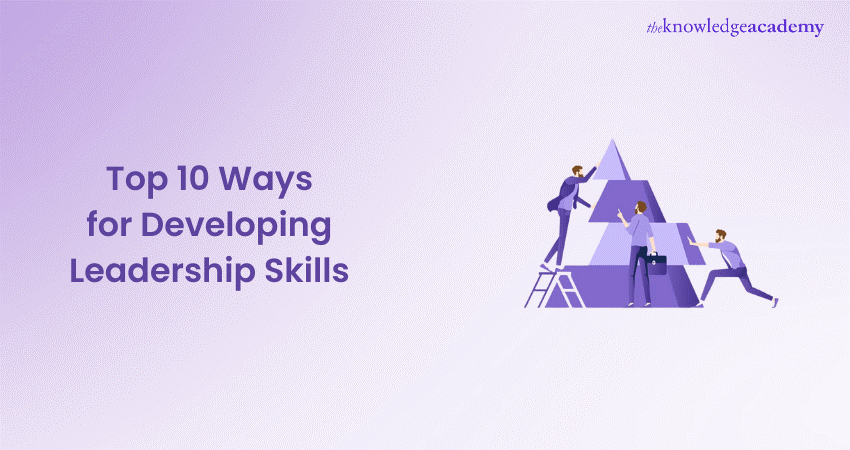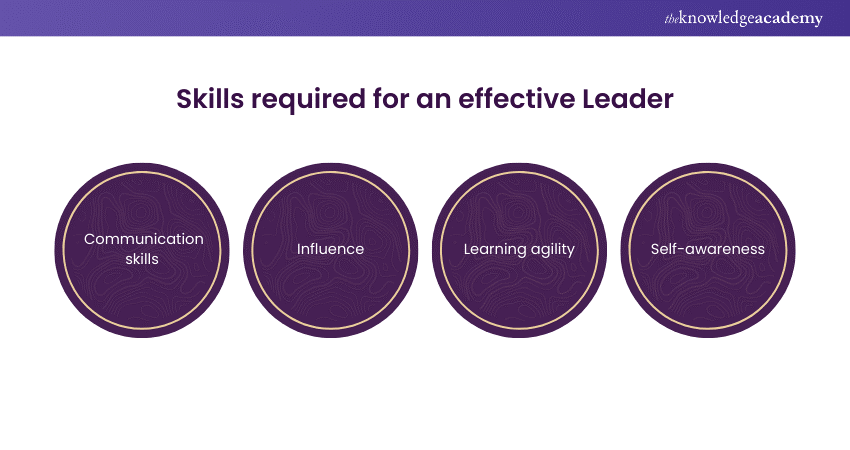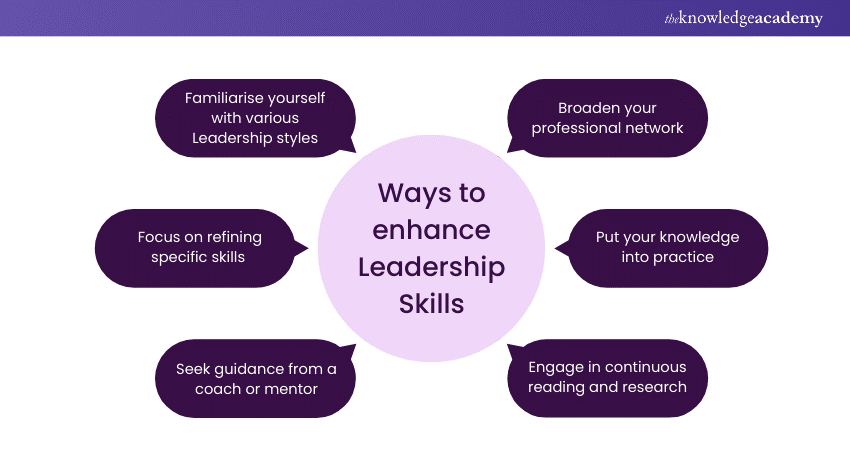We may not have the course you’re looking for. If you enquire or give us a call on 01344203999 and speak to our training experts, we may still be able to help with your training requirements.
We ensure quality, budget-alignment, and timely delivery by our expert instructors.

When navigating today's competitive landscape, Developing Leadership Skills is more crucial than ever. In a world where effective Leadership can mean the difference between success and stagnation, many struggle to develop these crucial skills.
In this blog about "Top 10 Ways for Developing Leadership Skills," we'll explore actionable strategies to enhance your Leadership effectiveness. Continue reading to learn more!
Table of Contents
1) What are Leadership Skills?
2) What makes an effective Leader?
3) Enhancing your Leadership Skills: 10 practical tips
a) Familiarise yourself with various Leadership styles
b) Focus on refining specific skills
c) Seek guidance from a coach or mentor
d) Engage in continuous reading and research
e) Put your knowledge into practice
f) Recognise your strengths and areas for improvement
g) Broaden your professional network
h) Define your Leadership goals clearly
i) Acknowledge and learn from failures, then move forward
j) Motivate and inspire those around you
4) Conclusion
What are Leadership Skills?
Leadership Skills are the abilities and qualities that help to inspire, influence, motivate and guide others towards achieving a common goal. Leadership Skills are essential for everyone to make decisions about the visions and missions of their organisations and to allocate resources properly to accomplish those goals.
What makes an effective Leader?
Powerful Leaders know how to motivate and influence people to work with them and achieve their vision. Developing good Leadership Skills and practices takes some time and effort. Although Leaders have different Leadership techniques, they share some common skills. Let's explore the essential skills required for an effective Leader:

Communication skills
Effective communication is vital for Leaders in all fields. Good Leaders express their ideas to all the listeners in an effective manner. They know the significance of body language and tone of voice. Leaders give clear explanations to their listeners to complete their tasks efficiently. Some important communication tips Leaders follows are to set clear expectations, be direct and simple and try to explain through stories.de
Influence
One of the essential Leadership Skills is the ability to influence your team members. Influence is the potential to affect the behaviour of others in a particular way. Successful Leaders influence and inspire people to work effectively and meet the desired goals. They take time to know the people, their working culture and what motivates them to achieve their goals.
Organisational skills, trust building, and team promotion are some of the best influencing skills every Leader should know. Logical, emotional and cooperative appeals are the three tactics every Leader should remember while influencing others.
Learning agility
Learning agility means how we can figure out a way through a new situation without having prior knowledge of that, only by using past experiences. Even after reaching an executive position in Leadership Skills, you should continue pursuing learning chances. This will help Leaders to stay relevant and upgrade their potential to lead teams and organisations effectively.
If you’re an agile learner, comfortable being uncomfortable and asking for new challenges, take feedback from experienced ones to learn and grow. Agile learners use new strategies they’ve learned before to prepare themselves to face any problems in the future.
Self-awareness
Self-awareness is a key to successful Leadership. Leaders take time to know what inspires them to work efficiently in their domain and their strengths and weaknesses. Effective Leaders possess a deep awareness of their thoughts, feelings, and behaviours. This allows them to recognise how their actions impact others and organisations.
Unleash your potential as a Leader with our Leadership Courses - Sign up now!
Enhancing your Leadership Skills: 10 practical tips
In today’s dynamic and rapidly evolving business landscape, the demand for strong Leadership has never been more noticeable. Leaders are expected to provide direction and cultivate a culture of trust, accountability and continuous improvement in people around them. Here are some practical tips which enhance your Leadership Skills:

1) Familiarise yourself with various Leadership styles
Familiarising yourself with different Types of Leadership Styles helps you to connect and communicate effectively with your team. When people can understand what type of Leader you are, they feel more comfortable interacting with you.
For example, if you have an affiliative Leadership style, you may need help to create emotional bonds with your teammates. Also, this style is concentrated on building trust within the team and promoting a sense of belonging to the organisation. If you prefer a coaching style of Leadership, then you spend a lot of strength and time recognising an individual's strengths and weaknesses.
2) Focus on refining specific skills
Refining Leadership Skills is essential for individuals aspiring to excel in their roles. It involves a continuous process of self-improvement, where one develops their abilities in communication, emotional intelligence, decision-making, and more. After knowing your strengths and weaknesses, you can choose the specific Leadership Skills that you want to focus on.
Developing Leadership Skills is an essential characteristic of personal and professional growth. Let's explore some of the Leadership Skills:
1) Adaptability
3) Communication
4) Decision-making
5) Negotiation
Leaders can inspire and motivate their teams effectively by dedicating time and effort to refine these skills.
3) Seek guidance from a coach or mentor
Mentoring is a positive relationship between experienced and less experienced individuals. The mentor provides guidance, support and insight from their journey to the less experienced individual to help them grow personally and professionally. Mentoring or coaching involves a long-term commitment, promoting a deep sense of trust and connection.
Seeking guidance from a coach or mentor works well in a business environment. Mentors are usually retired or senior staff with knowledge about the industry and proficiency to guide your professional development. Once you find a mentor, contact them to know if they’re ready to guide you. You can reach out to them either in person or via email. Your mentor can help you to estimate your skills and goals.
4) Engage in continuous reading and research.
Continuous reading and research are essential components of Leadership growth. By continuous reading, individuals can broaden their knowledge, gain new views, and improve their abilities by staying on the latest Leadership trends, insights, and best practices. Moreover, you can enhance your decision-making, communication, and creativity by exploring case studies of great Leaders and engaging with management literature.
Leaders who prioritise continuous reading and study demonstrate a dedication to both personal and professional growth. This commitment positions them to effectively navigate obstacles, inspire their teams, and drive positive change within their organisations.
5) Put your knowledge into practice
Implementing what you've learned in the journey of Developing Leadership Skills is crucial. It involves translating theoretical understanding and acquired skills into physical actions and outcomes. Leaders who apply their knowledge in real-world scenarios demonstrate their ability to lead by example, solve problems and achieve results.
Whether implementing new strategies, making data-driven decisions or promoting a culture of innovation, putting knowledge into practice requires courage, creativity and adaptability. By bridging the gap between theory and application, Leaders derive organisational success and inspire confidence and trust among their teams.
Finally, hands-on experience is essential in the transformation from learner to Leader. Leaders make an actual difference by putting their ideas into practice, creating a lasting impression on their companies and communities.
6) Recognise your strengths and areas for improvement
Recognising your Leadership strengths and weaknesses can help you know where to improve your Leadership Skills. One of the most efficient ways to turn your weakness into strength is by learning from others experienced in that skill. Knowing your strengths and weaknesses will influence your path to continued Leadership growth.
Make a list of your strengths and weaknesses that are as specific as possible and ask for feedback from experienced professionals or someone who knows that field. Once you’ve identified your strengths, use them in your Leadership role. Institutions and organisations provide a variety of free and paid courses that can help you to recognise Leadership strengths and areas of improvement.
7) Broaden your professional network
By broadening your professional network, you can identify career opportunities and how Leaders overcome problems and develop strategies to help their teams succeed. While expanding your network, be sincere, share resources, use your power thoughtfully, communicate and negotiate effectively.
Whenever a conflict occurs within your network, respect the opposition's view. Further, look for points of mutual agreement and express your position in a way that helps resolve the conflict. Then, you can expand your network by connecting with Leaders working in your organisation. Additionally, attending industry events and seminars and interacting with others on social media sites can also help.
8) Define your Leadership goals clearly.
Leadership goals are well-defined objectives that are created to improve your skills as a Leader. Developing Leadership Skills begins with a clear understanding of your goals and aspirations. Before beginning your Leadership development journey, it's crucial to reflect on your goals and the kind of Leader you aim to be.
Effective Leaders understand the importance of setting Specific, Measurable, Achievable, Relevant and Time-bound (SMART) goals that align with their vision. To define your Leadership goals clearly, first understand what you want to perform in the short and long term.
While defining your Leadership goals, knowing your team's strengths and weaknesses is essential. Once you define your goals, it is vital to communicate with your team members and motivate them to work towards a common objective.
9) Acknowledge and learn from failures, then move forward
Learning from failures and moving forward is a crucial aspect of Leadership development. Effective Leaders understand that failures are common in the path to success. Admit it when you’ve failed and learned from your past mistakes because it builds trust within your team. Failures can also provide opportunities for growth. When our experiments yield undesired results, overcoming these mistakes, learning from them, and moving forward is essential.
10) Motivate and inspire those around you
As a Leader, you should inspire and motivate people around you or your teammates. Leadership Skills empower individuals to motivate others and create a positive and empowering work environment conducive to high performance and achievement. Motivated employees are more likely to be present and improve their performance. They also have a good relationship with Leaders or management.
Even employees want to know where the business is heading and their team role. So, their Leaders should give them clear motivation and direction, especially in these fast-changing times. Sometimes, people need someone who listens and motivates them to work. So, whenever your teammates or people around you need motivation, offer it effectively.
Elevate your career with our comprehensive Executive Leadership Presence Training.
Conclusion
Developing Leadership Skills is not merely a journey but a transformative process. It empowers individuals to unleash their full potential, making a meaningful impact on organisations and communities. Best of luck on your Leadership journey!
Unlock your Leadership potential with our Agile Leadership Training. Sign up today!
Frequently Asked Questions
What's the connection between training and Leadership development?

Training serves as one avenue among several for fostering Leadership growth. Other methods include stretch assignments, special projects, coaching, job shadowing, international assignments, and professional conferences, to name a few.
Can you provide examples of topics covered in Leadership development initiatives?

Leadership development covers communication, supervision, teamwork, Emotional Intelligence, accountability, and Time Management. Additionally, it covers critical thinking, transition management, performance reviews, and handling difficult conversations, among others.
What are the other resources and offers provided by The Knowledge Academy?

The Knowledge Academy takes global learning to new heights, offering over 3,000 online courses across 490+ locations in 190+ countries. This expansive reach ensures accessibility and convenience for learners worldwide.
Alongside our diverse Online Course Catalogue, encompassing 19 major categories, we go the extra mile by providing a plethora of free educational Online Resources like News updates, Blogs, videos, webinars, and interview questions. Tailoring learning experiences further, professionals can maximise value with customisable Course Bundles of TKA.
What is the Knowledge Pass, and how does it work?

The Knowledge Academy’s Knowledge Pass, a prepaid voucher, adds another layer of flexibility, allowing course bookings over a 12-month period. Join us on a journey where education knows no bounds.
What are related Leadership courses and blogs provided by The Knowledge Academy?

The Knowledge Academy offers various Leadership Courses, including Leadership Skills Training, Agile Leadership Training and Creative Leader Training. These courses cater to different skill levels, providing comprehensive insights into Leadership Qualities.
Our Business Skills Blogs covers a range of topics related to Leadership, offering valuable resources, best practices, and industry insights. Whether you are a beginner or looking to advance your Leadership Skills, The Knowledge Academy's diverse courses and informative blogs have you covered.
Upcoming ILM, CMI Leadership & Management Resources Batches & Dates
Date
 Agile Leadership Training
Agile Leadership Training
Fri 11th Apr 2025
Fri 13th Jun 2025
Fri 15th Aug 2025
Fri 10th Oct 2025
Fri 12th Dec 2025






 Top Rated Course
Top Rated Course



 If you wish to make any changes to your course, please
If you wish to make any changes to your course, please


